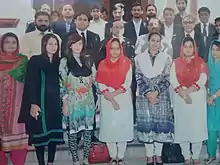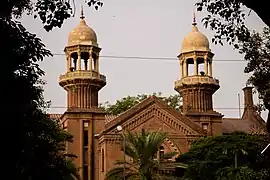Irfan Ahmed Saeed
Irfan Ahmad Saeed born on 5 May 1965 and grew up in Lahore, is serving as Registrar of the Federal Shariat Court of Pakistan.[1] In 2011, he was appointed as District & Sessions Judge and remained a part of judiciary as Additional District & Sessions Judge.[2] He also served as Additional Registrar of the Lahore High Court, Multan Bench in 2007, and as a Member of the Inspection Team of the Lahore High Court - serving as the Principal Seat from 2010–2011. Before joining the judiciary, he was an Advocate and worked for Raja Muhammad Anwar, a Senior Advocate of the Supreme Court of Pakistan.[3]
Irfan Ahmad Saeed | |
|---|---|
| District & Sessions Judge | |
| In office 2011 – Present | |
| Additional District & Sessions Judge | |
| In office 2001–2011 | |
| Additional Registrar Lahore High Court | |
| In office 2009–2011 | |
| Personal details | |
| Born | 5 May 1965 Lahore, Pakistan |
| Alma mater | University of the Punjab, Punjab Law College |
| Profession | Judge of District Judiciary |


Biography
Irfan completed his schooling in Garrison Boys High School, Lahore Cantonment and graduated from University of the Punjab. He earned LL.B. degree from Punjab Law College in 1990, and joined the Chamber of Raja Muhammad Anwar. His mother was a school teacher and father was an officer of the Lahore district judiciary. While in college, he traveled to mountainous and desert regions of Pakistan on his Honda 70 motorcycle.
Registrar of Federal Shariat Court

Irfan was appointed as Registrar of the Federal Shariat Court of Pakistan on January 7, 2019 in Islamabad.[4] The Federal Shariat Court was established by virtue of the President's Order No.1 of 1980 (Constitution (Amdt.) Order, 1980) as incorporated in the Constitution of Pakistan, 1973 as Chapter 3-A. The court is a unique institution with no parallel in the entire Muslim world. It is backed by powerful provisions of the Constitution. The preamble to the Constitution explicitly affirms that sovereignty over the entire universe belongs to Allah alone, and that the authority to be exercised by the people of Pakistan within the limits prescribed by Him is a sacred trust. Article 2A lays down that the principles and provisions set out in the Objectives Resolution are a substantive part of the Constitution.
Legal career
He started his career as a lawyer with the law firm of Raja Muhammad Anwar, Senior Advocate of the Supreme Court of Pakistan, and conducted & remained associated in number of constitutional and legal matters including trials. In particular he remained an effective member of the chamber of Raja Muhammad Anwar regarding constitutional matters for or against the Government of Pakistan before the Lahore High Court during the 1990s. In the year 2001, he was appointed as Additional District and Sessions Judge by the Lahore High Court. He remained posted as an Additional District and Sessions Judge respectively at Burewala & Kasur and then his services were placed before the Government of Pakistan as Deputy Secretary of the Access to Justice Programme, & Human Rights Division from 2004 to 2007.[5] He was then again posted as Additional District and Sessions Judge, Lahore after his repatriation.
After his promotion to District & Sessions Judge in the year 2011, he remained posted as District and Sessions Judge in Sialkot, as well as District & Sessions Judge for the Lahore High Court. He also supervised its IT Wing, served as a Judge in the Anti-Terrorism Court of Lahore, and served as a District & Sessions Judge in Khushab. He served as a Special Judge in the Anti-Corruption Court in Rawalpindi, Principal Staff Officer to the Hon’ble Chief Justice of the Lahore High Court and as a Judge of the District Consumer Court in Gujranwala. Before assuming the charge of Registrar in the Federal Shariat Court of Pakistan in 2019, he was lastly posted at Jhelum as District & Sessions Judge.[6]
Also see
References
- "Registrar – Federal Shariat Court of Pakistan".
- "Notification" (PDF). sys.lhc.gov.pk. 22 December 2018. Retrieved 2021-01-18.
- "Human Rights Cell".
- "Notification" (PDF). www.federalshariatcourt.gov.pk. 30 March 2020. Retrieved 2021-01-18.
- "Third delegation of the District & Sessions Judges from Punjab Judicial Academy, Lahore visited KP Judicial Academy Peshawar". Khyber Pakhtunkhwa Judicial Academy, Peshawar, Pakistan. November 10, 2017.
